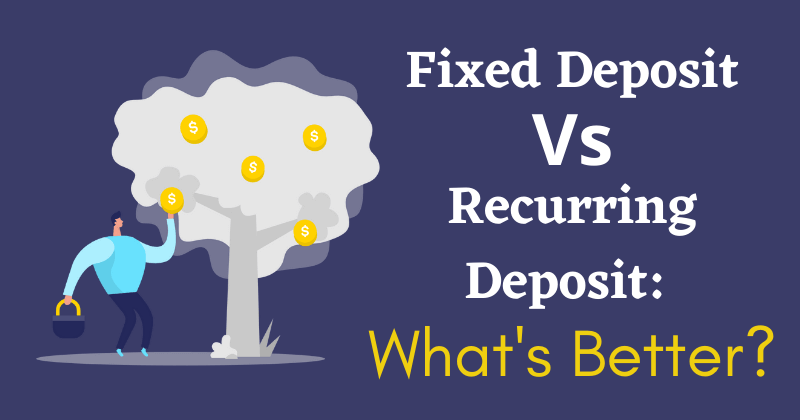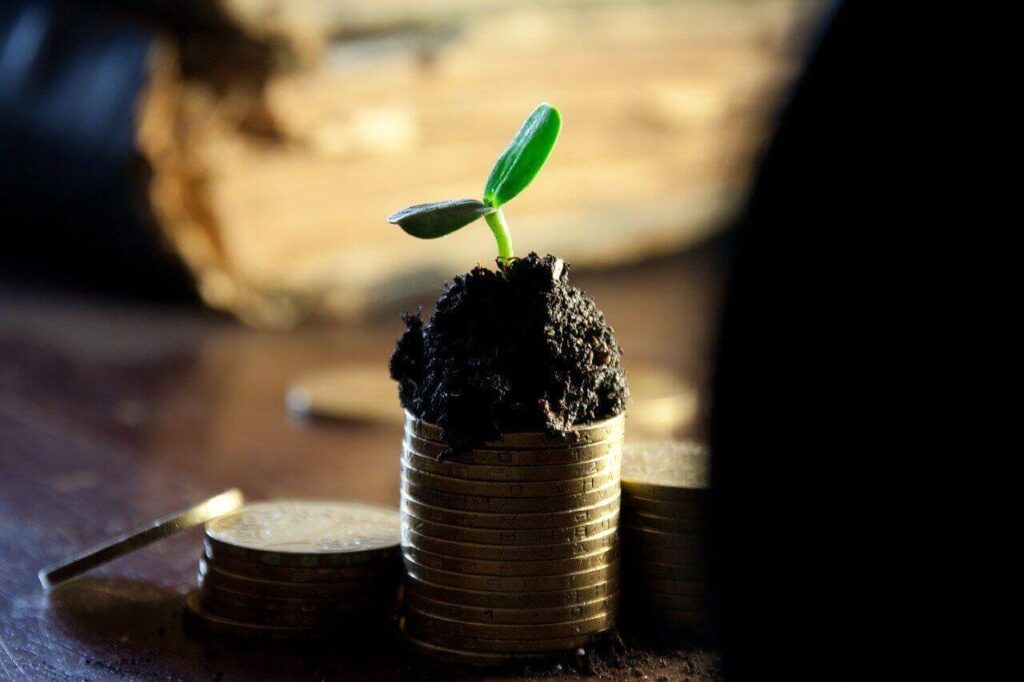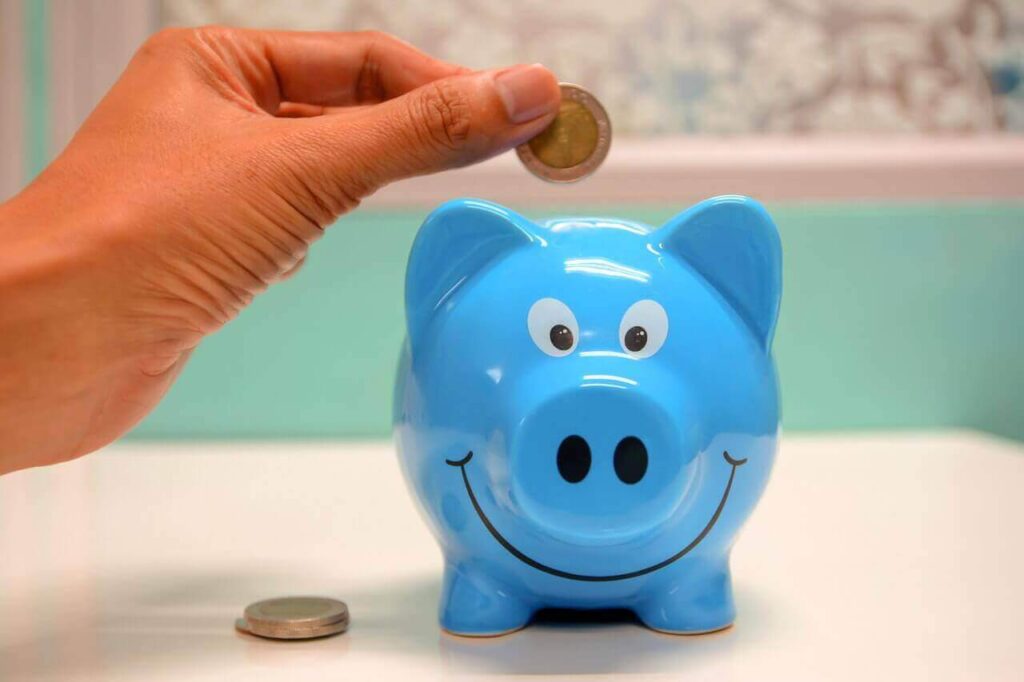Fixed Deposit vs Recurring Deposit: What’s Better?

This article may contain affiliate links. If you make a purchase using my links, I’ll earn a small commission at no extra cost to you. I appreciate your support!
Many times investors get confused about whether to invest in Fixed deposits or Recurring deposits.
The reason why so many people opt for these investments is that they offer security and fixed returns on investment.
Fixed Deposit vs. Recurring Deposit: What’s Better?
Decoding Fixed Deposits: A Secure Investment Option
Fixed deposit is an instrument offered by Banks and NBFCs. An FD is a great investment because it offers the utmost safety and guaranteed returns.
In a Fixed Deposit account, an amount is deposited for a fixed period. Interest is determined at the time of investing in the policy and interest is given for the amount invested for a fixed period.
So an FD is an investment instrument where you invest one-time money for a fixed interest rate at a fixed period.
Once the policy is matured, the amount invested and the interest assured will be credited to your bank account.
Understanding Recurring Deposits: Consistency in Savings
In a Recurring Deposit account, an amount is deposited at fixed intervals (generally each month).
The main benefit of an RD is to develop the habit of saving on a regular consistent basis.
So an RD is an investment instrument where you invest a particular amount at regular intervals for a fixed interest rate at a fixed period.
On maturity of the policy, the amount invested along with the interest assured will be credited to your bank account.
Key differences Between Fixed Deposits and Recurring Deposits

- Investment in FD is a one-time investment as Investment in RD is made at fixed periods.
- RD works best if you want to invest a small sum of money consistently whereas FD works best if you want to invest all the money at once.
Tax Structure
Both of these investments have the same tax structure. Tax is deducted at the source which means the interest earned on the investment is added to your total income and taxed at your yearly personal income tax rate.
It means, that if you fall in the 30% tax slab, interest on your FD/RD will be taxed at 30%.
There is a small difference; In a Fixed deposit, banks deduct TDS (tax deducted at source) if the interest earned from the income is more than Rs 10,000 while there is no deduction in Recurring deposits.
Why Opt For Fixed Deposit And Recurring Deposit Over Riskier Stocks?

While the return on investment (ROI) for stocks is much higher than the return received from a Fixed deposit account or recurring deposit account, almost all Individuals invest at least a part of their Investment in FDs and RDs.
Why exactly?
Because they are secure forms of investment. Both these Investment instruments are Risk-Free.
Let’s say a Recession hits tomorrow, the market crashes, and prices of stocks, gold, and other investments will drastically fall giving you a negative return on investment.
But your earnings on the fixed deposit or recurring deposit account won’t change as the rate of interest you will receive for the amount you invest in any of these two investments is determined at the investing stage.
The same goes for Mutual Funds, they offer a higher return on your investment but it’s not guaranteed like FDs and RDs.
What happens When You Break Your Fixed Deposits or Recurring Deposits?
You need urgent cash, you don’t have enough savings to manage your sudden expenses.
At this time the only Investment you’ll think of is your fixed deposit account or recurring deposit account.
Yes, you can approach the bank and withdraw your money before the due date but by doing so your bank deducts some interest you received as a penalty.
For example: If you were getting 7% interest on your money initially, by the time you break your FD or RD, the bank will pay you the sum + interest at 6.5% instead of 7%. 0.5% is deducted for withdrawing money before the due date.
Fixed deposit vs. Recurring deposit?
The interest rate on both, FD and RD is the same. Even then the overall interest earned after the specified period is more in fixed deposit as compared to recurring deposit. Here’s an article by Investopedia on Fixed Deposits (Term deposits).
It means if you invest in FD and RD at the same interest rate for the same time frame, an FD will give you more returns than an RD.
When we practically compare both these investments, the interest we earn on FD is more than the interest we earn on RD.
Let’s assume you invest Rs 24,000 in an FD at the beginning of the year and Rs 2,000 each month in an RD for a year. The interest you will receive on FD and RD is 9% compounded quarterly.
After a year your total interest on FD will be Rs 2,324 and on RD will be Rs 1,195. The difference between the two is Rs 1,129.
Why the difference in interest earned?
The main reason is that in FDs you invest lump sum money at the start of the year, thus interest is on the entire amount for the entire year.
Whereas in RD’s, the first installment earns interest for 12 months, the second for 11 months, and so on. Due to this imbalance, interest earned on FD’s is greater than RD’s.
The Smart Approach to FDs and RDs

By now you’re clear that an FD can make you more money than an RD. Does that mean you accumulate money in your savings account for 1 year and then invest that in FD and completely ignore RD’s?
While some might say yes to this strategy, I’ll give you a better strategy to grow your money.
Let’s take an example to better understand this problem.
Peter has Rs 50,000 in his savings account and he earns Rs 10,000 a month.
Out of the 50,000 he has in savings, he can invest 35,000.
He saves Rs 5,000 each month and can invest Rs 3,000 each month.
He has three options with him:
- He can invest 5,500(3,000+2500) each month in an RD. (35000/12=~2500)
Option 1 is good but Peter will earn less interest as he won’t be using FD to earn more interest.
- He can collect 71000(36,000+35,000) in a year, then opt for FD. (36,000=12×3,000)
Option 2 is also understandable but here we lose time, for an entire year we save our money in a savings account where the interest earned is negligible.
- Or he can do both (The Smarter Approach)
Out of the 50,000, 35,000 will go for opening a Fixed Deposit account. Rest will be saved for general and unforeseen expenses.
Then out of his monthly income, he can invest 3,000 right? So that goes for opening a Recurring deposit account. Investment each month = 3,000.
After a year, the 2,000 he saved each month after expenses and payment towards RD, will be 24,000. Keeping some cash aside, he can invest a part of it open another FD, and keep pouring money toward RD (3,000).
Note: This layout solely focuses on Fixed deposits and recurring deposit accounts. You can lower your FD and RD investments and invest that money to buy stocks, bonds, gold, debentures, real estate, etc.
Option 3 (The Smart Approach works best as we use the power of Time combined with FD’s higher interest amount)
Over the years, FDs and RDs have been underrated mainly because investments like mutual funds are hyped. While these are great investment opportunities, an investor must make sure that he/she is willing to take some risk while investing in such assets.
I invest in stocks because I am willing to take a few risks and enjoy great returns. A smart investor must allocate his funds properly – a part should be in FDs/RDs, a part should be in stocks/mutual funds, a part should be in a savings account, a part in any other investments you prefer, and the rest should be saved in an Emergency Fund.
Do you invest in Fixed deposits and Recurring deposits? If not open one today. Why! For the simple reason that it offers Risk-Free returns!
Have you enjoyed this post? If so, you might want to subscribe to my newsletter. It usually contains life lessons and money-related topics, some interesting observations, links to articles or books I’ve read, and tips to be a better person. If you’re interested in these things then subscribing will be simply wonderful 🙂 PS: Subscribe and Get your Freebie below!
Also, I’m a YouTuber now! If you’re interested in Pinterest Marketing, Blogging, or business-related things, Subscribe to my Channel and I’ll see you in the comments!
Informative piece.
Thank you Kawasi! Have a great day ahead!